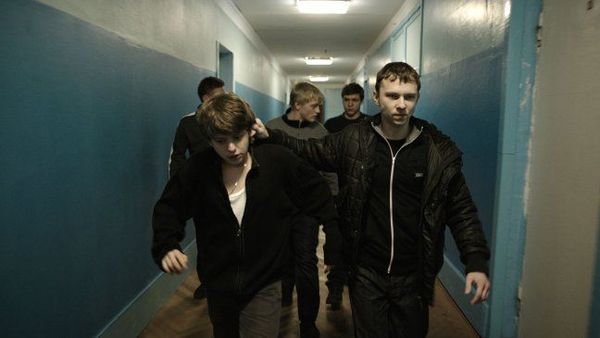Eye For Film >> Movies >> The Tribe (2014) Film Review
The Tribe
Reviewed by: Amber Wilkinson

Ukrainian Myroslav Slaboshpytskiy's inventive if harsh debut feature cleverly builds its tensions through contradictions. The whole enterprise is, on the one hand, familiar to audiences - a brutal gang culture, fuelled by a boarding school system where bullying is the norm and where young women, inevitably, are on the bottom rung. The endemic violence and need to respond in kind reminded me, in particular, of other eastern European films such as Harmony Lessons (2013) and Ilmar Raag's The Class (2007).
Yet, despite the surface similarities, the director renders the situation utterly alien by setting it within the confines and environs of a school for the deaf, sternly warning viewers that there will be no subtitles, voice-over or translations, before the film begins. As there is no dialogue - everyone communicates in Ukranian sign language - we are not even privvy to the children's names (although they are named in press notes for ease of reference), which adds both another layer of estrangement and intensity, as full attention is required to understand and keep track of the players.

And it is in this intesity that Slaboshpytskiy pulls off his greatest trick, we are drawn into proceedings, straining to understand what happens as new kid Sergey (Grigory Fesenko) arrives at the instution, quickly homing in on a pecking order encapsulated in one trip to the cafeteria that sees his place instantly marked out as just one step above the kid with Down's Syndrome. As we strive to get closer to what is happening, Slaboshpytskiy's camera hangs back in long, lingering takes, keeping a distance so that we can better see the full range of gesticulated conversation between the characters, sometimes balletic, sometimes almost cartoonish but always conveying a well of emotion. As things take a more sinister turn later in the plot, the camera remains unflinching even as we suddenly wish we could turn away. And when cinematographer Valentin Vasyanovych comes closer, he often tracks characters from behind, which makes us all-too-aware of how vulnerable a deaf person is to things they cannot see - a lesson brought crushingly home in a darkly comic scene at the local truck stop, where the school gang bring the girls for nightly prostitution deals.
It is here that Sergey begins to make progress, climbing up the pecking order from basic scams to running the girls, while forming an attachment to one, Anya (Yana Novikova), based first purely in transactional terms - illustrated by a lengthy sex scene - but quickly morphing into something else. Buying and selling are everywhere, though profit appears to be bleakly minimal, yet Slaboshpytskiy goes to show, first through Anya and then the actions of Sergey that some transactions can hold a lot more - and worse - than we have bargained for.
The power of this drama also lies in the fact that although the protagonists are living in a world of silence, we can hear the other goings on around them - and when noises come from the cast, of exhiliration and, particularly, pain - they are all the more visceral for it. Slaboshpytskiy's film requires you to read its signs, about exploitation, isolation and fear - if you do, it speaks volumes.
Reviewed on: 20 May 2015
















